
- Pet Passports
- Airline Pet Policies
- Ferry Cruise Ship Policies
- Other Forms
- Pet Carriers
- Pet Carrier Accessories
- Pet Crate Accessories
- Pet Microchips
- Microchip Scanners
- Bulk Discounts Microchips Scanners
- New Arrivals
- Customer Gallery
- Security/Privacy
- Shipping/Returns

Popular Brands
- Pet Passport Countries P-Q-R
Pet Passport Russia

Russia Pet Passport - Page 1

Russia Pet Passport - Page 2

Add to Wishlist
Please create a new Wishlist
- Description
The Russia Pet Passport package contains information and detailed step by step instructions on importing your dog or cat to Russia from any country . If your pet is not traveling to Russia, then you can select the country your pet is traveling to by clicking here .
Carefully following these instructions will make clearing customs easier and quicker. The instructions will also help to avoid having your pet denied entry, put into quarantine or returned to your country of origin.

The Pet Passport Store has been a trusted and reliable source of information and products for traveling pet owners for over 14 years. The information we provide in our passports is always the most current and accurate available. We have done the research for you.
What You Get with your Russia Pet Passport:
- Detailed instructions to import your dog or cat to Russia from any country
- Veterinary Health Certificate Instructions
- Required Vaccinations
- Microchip Identification (optional)
- Parasite Treatments
- Arrival in Russia
- Inoculation Record Instructions
- Carrier and Crate Requirements
- Tips on Flying a Pet Internationally
- FREE unlimited email support both for you and your veterinarian, should either of you have any questions.
Also included at no additional cost are forms to transport your pet to Russia:
- Veterinary Health Certificate for Russia
- Parasite Record
- Airline Health Certificate
- Layover Considerations & Requirements for Airline Pet Travel
- Inoculation Record - keep your pet's vaccinations in one place for easy customs clearance
- Pet Passport Folder - (Free with First Class Mail Delivery Options above) Click Here to View
Delivery Options (select above):
Email - faster delivery - multiple copies can be printed if you are transporting more than one pet. First Class Mail - we print instructions and forms and mail to you. There is a cost for printing and postage with this option.
Additional Information:
Is your pet microchipped? Your dog or cat must be microchipped prior to rabies vaccination. Click here for ISO 11784/11785 compliant pet microchips.
It is our objective to prepare the traveling pet owner for all entry requirements that may arise as a result of traveling by air, sea or ground. Enforcement may not be consistent in every country or on every airline, and having proper documentation will better ensure that no problems will arise during your travels.
If you purchase our instructions and forms prior to 30 days before you travel, please check back with us to make sure there have been no changes in the rules or forms required to take your pet to Russia. All updated instructions and forms are provided by email free of charge.
We cannot offer refunds on pet passport packages unless there is a problem with the information or forms provided.
You may also need :

Have a crate for your pet already? Click here to update your pet crate to IATA standards .
Have a carrier for your pet already? Click here for pet pads and accessories .
FAST SHIPPING
EASY RETURNS
GREAT SUPPORT
Related Products
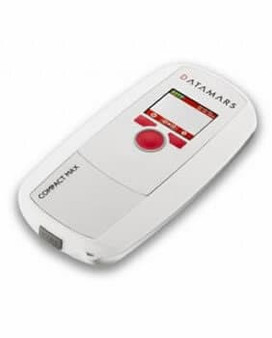
DATAMARS Microchip Scanner Compact Max
Datamars Microchip Scanner - Compact Max This is the North American model of this scanner. It can be used worldwide and reads all the microchips listed below. The best of Datamars reading...
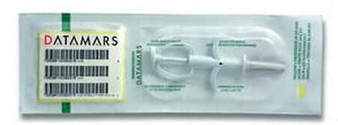
Pet Microchip
Datamars Pet Microchip Registered $14.00 off during our clearance sale!

Petmate Airline Cargo Crate Medium
Petmate Airline or Auto Cargo Crate - Medium

Update Your Pet Crate Kit
Do you already have a crate for your pet? Need accessories to make it IATA compliant? Want products that will keep your pet safe, dry and comfortable? Pick only what you need to bring your...
Datamars Microchip Scanner - Compact Max This is the North American model of this scanner. It…
Do you already have a crate for your pet? Need accessories to make it IATA compliant? Want pro…
404 Not found

Questions about Pet Travel to Russia
Name: Kathy Number of Pets: 1 Pet Type: Dog Pet Breed: Yorkie From: Kansas City, USA To: Russia
What are the requirements to relocate my pet from Kansas City to Russia? Are microchips required? What paperwork and vaccines do I need?
I really appreciate any info you can give me.
Sure, we'd be happy to help; here is an overview of the pet import requirements for Russia . To summarize, yes, your dog will need a microchip (implanted before the rabies vaccine is administered), and the rabies vaccine must be given at least 30 days before departure and less than one year before departure.
A few vaccinations are also required, including Hepatitis, Distemper and DHP (we recommend doing the combined DHLPP vaccine and Bordatella, as well).
You'll also need to obtain a Rabies Certificate and an International Health Certificate , and these forms will need to be stamped by the USDA. For your reference, here are a few frequently asked pet travel questions to help you form a picture of the overall pet travel process.
Feel free to contact us for a quote if you're interested in hiring professional assistance, and either way, good luck with your move!

- Buenos Aires
- Kuala Lumpur
- Los Angeles
- New York City
- International Health Insurance
- Investment Advice for Expats
- Booking Travel for Expatriates
- Expat Moving Services
- Property Rental
- Country Visa Services for Expats
- Online Global Health Insurance Quote
- Citizenship by Investment (Golden Visas)
- Foreign Exchange for Expatriates
- Expat Mobile App
- Expat’s Manual
- Expat Forums
- Business Directory
- Blog articles
- Forum topics
- News articles
Our guide was written by Tom Rogers and Rebekah Smith .
Bringing your pet
Cats and dogs.
It is relatively easy to bring cats and dogs to Russia. There is no quarantine requirement, although veterinary certificates and immigration records are necessary. You should be sure to travel together with your pet, and either carry it on the plane, or ensure it travels as accompanied baggage or excess luggage (not cargo!).
If you can do this, then you receive your pet at the baggage claim when you arrive in Moscow, and simply have to register your cat or dog at the airport veterinary station before you may clear customs with your pet and remaining luggage. You will need to present the following:
- a pet registration fee of about 400 RUR
- a certificate of health issued by a certified veterinarian between three and ten days prior to your pet’s arrival (English is acceptable).
- your pet’s vaccination records, which must include all feline/canine infectious diseases, and a rabies vaccination no older than one year and no more recent than one month.
The veterinary station officer will stamp and date your pet’s certificate of health, which will then be your pet’s official import document. You must present the stamped certificate to take your pet through customs.
If your pet must travel as cargo, for unavoidable reasons, you will need to obtain an international health certificate for your pet. Your pet will be delivered to a cargo airport and will need to clear import customs, which involves extensive documents, fees, and time, not all of which can be resolved prior to your pet’s arrival in Moscow. You should enlist the professional services of a Moscow veterinary experienced with import of pets.
Birds, rabbits, guinea pigs, and exotic animals
The import of any animal other than a cat or dog to Russia is very complicated and not recommended. Some pets are forbidden from import and export entirely. Russia is a signatory to the Convention on International Trade in Endangered Species of Wild Fauna and Flora, which regulates much of the import of exotic animals.
If you do decide to bring a pet such as a bird or guinea pig to Moscow, note that there will likely be a 30-day quarantine requirement. This quarantine is best undergone and certified at the place of departure. You should consult with a veterinarian in your home country, and hire the services of a professional, Russian-speaking veterinarian in Moscow to help you handle the import.
Keep in mind:
- The European Union has additional requirements for any pets transferring through an EU airport. These include written proof of tick and de-worming treatment administered two days before departure.
- ISO Standard Microchips are not yet required in Russia, but are required in many other European countries. If you are able, it is a good idea to get this chip implanted before you leave your home country.
- There are special restrictions on pregnant or very young (less than three months) cats and dogs.
- Russia’s export requirements and your origin country’s import requirements will apply to your pet if you ever want to bring it back. Verify your origin country’s import requirements to make sure you can bring your pet home when your time in Russia ends!
Leaving Russia with your pet
If you need to take a pet with you out of Russia, similar requirements apply: you must provide a certificate of health from a licensed Russian veterinarian, and evidence that all vaccinations, including rabies, are up to date. Furthermore, if there is any question about the intrinsic breeding value of your dog or cat, you must obtain a certificate of pedigree from the appropriate Moscow breeder’s club. You may need to pay export duties based on this pedigree certificate.
Of course, you should also verify the import requirements of your destination country. Most will require an international health certificate, which you can obtain at the departing airport for a fee of about 200 RUR, provided you can present a health certificate from a licensed Russian veterinarian.
Professional Pet Import Assistance
- Dr. Yuri Shishmaref, DVM Valeriya Shismareva, Interpreter A husband-and-wife team that provides professional pet import assistance service. +7 (495) 694 03 88 http://www.moscowanimals.org
Department of Environmental Protection
- Wild animals and birds +7 (495) 254 67 33; 254 86 01 (English); 127-84 10 (Russian)
- Domestic animals and birds +7 (207) 83 86 (English); 975 59 29 (Russian)
Ariport Veterinary Stations
- Sheremetevo Airport (Russian only) Passenger Terminal 1: +7 (495) 578 62 44 Passenger Terminal 2: +7 (495) 578 76 53 Cargo Terminal: +7 (495) 578 66 16
- Domodedovo Airport (Russian only) All Terminals: +7 (495) 323 85 74
Moscow Breeder’s Club
- Cats +7 (495) 159 18 05; 132 00 03
- Dogs +7 (495) 459 09 03; 459 00 03
Useful links
- http://www.101.ru A popular online Russian radio station.
- http://www.masterRussian.com Site where you can master Russian grammar, learn new vocabulary and practice speaking and reading Russian.
- http://www.translit.ru A transliteration site – type in Roman letters and they are automatically converted to Cyrillic.
Interesting fact
Whilst all reasonable care has been taken in the preparation of this publication, the owner of Expatinfodesk.com does not accept any responsibility for any loss suffered by any person acting or refraining from action as a result of relying upon its contents.
Privacy Overview

Would you like to know more about international health insurance & get a free global health insurance quote? Choose a custom global medical plan which meets your needs and budget
GET A FREE QUOTE
- Bahasa Indonesia
- Slovenščina
- Science & Tech
- Russian Kitchen
Why does Russia ban puppies and kittens from planes?
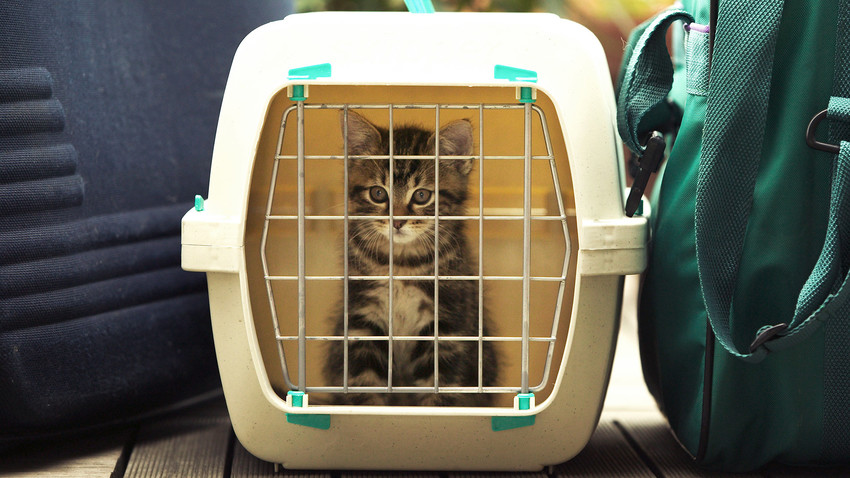
We all love our pets, and it’s heartbreaking to leave them when we go on vacation. While it would be nice to take them, it’s not always easy. Just imagine a dog, especially a big one, spending many hours flying from the U.S. to Russia, caged and without his owner. Who would want that?
Certainly, there will be situations when taking a pet is necessary, such as when you move to another country. In that case, you’ll have to face the tribulations of traveling with pets. Therefore, make sure you familiarize yourself with all the rules and regulations needed to make the journey as smooth as possible.
Going to Russia
Proper documentation is crucial, and to enter any country you’ll need an international veterinary certificate and a certificate of vaccination against rabies, said Vladimir Starinsky, managing partner at the law firm, Starinsky, Korchago and Partners. The rabies shot should be done at least one month before departure because 30 days is the period after which the vaccination begins to take effect.
Keep in mind that animals not yet four months old, such as puppies and kittens, are not allowed to travel due to the fact that vaccinations can only be administered no earlier than the age of two months. The rabies shot can be given at three months, but then you must keep in mind the obligatory month of quarantine. So, if you plan to bring a puppy home from Russia, wait until it’s safe for the pet to travel.
If you plan to visit Russia with your dog or a cat, (not more than two), then you don’t need special permission from the Federal Service for Veterinary and Phytosanitary Monitoring (Rosselkhoznadzor). An international veterinary certificate will be enough to prove that your pet had a medical check-up at least five days before the trip, and that it had the following vaccinations in the last 12 months: rabies, plague, hepatitis, viral gastroenteritis, canine parvovirus and adenoviruses, as well as leptospirosis for dogs, and rabies and panleukopenia for cats.
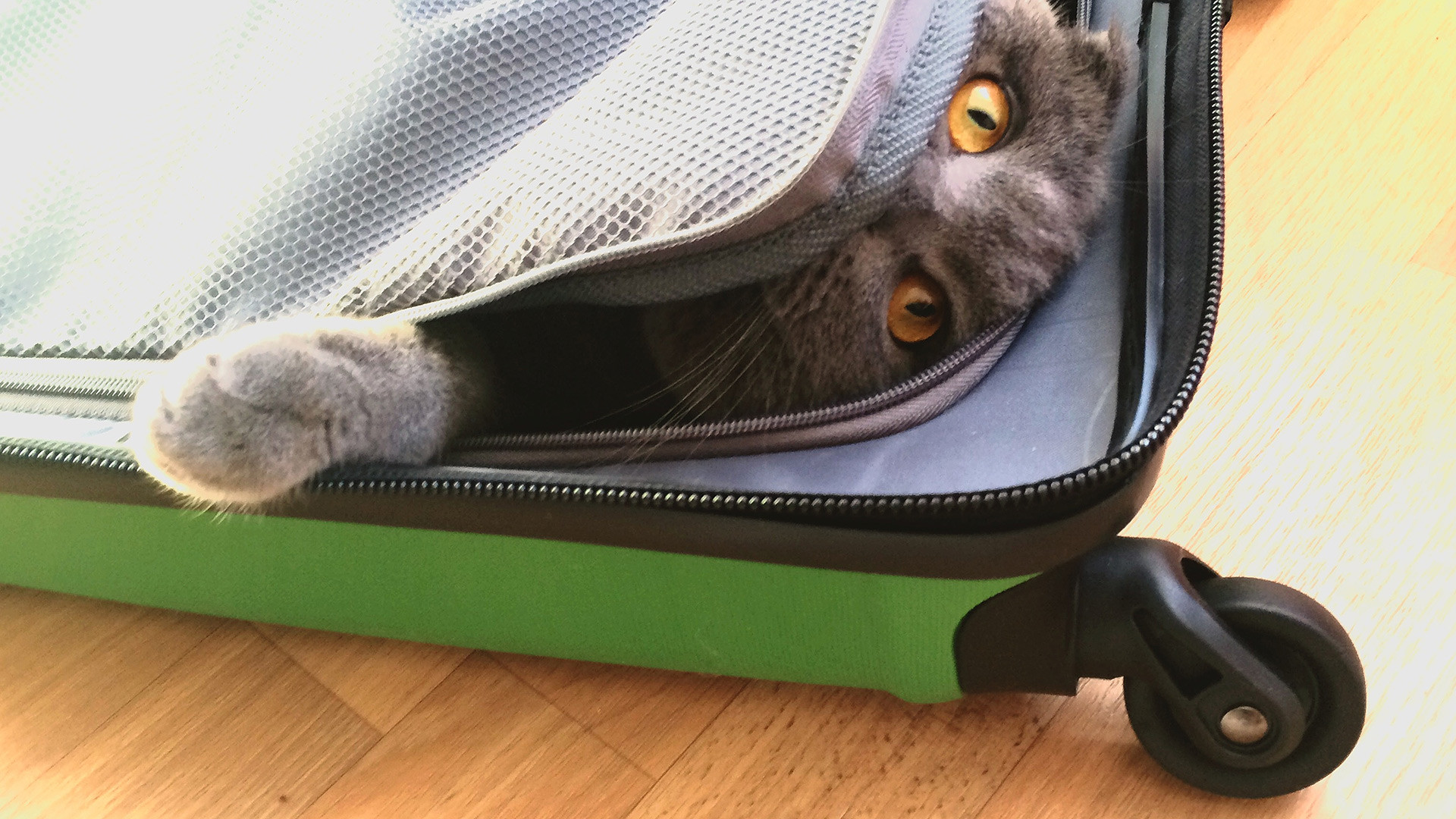
Leaving Russia
When leaving the country, no extra documentation is needed. A Rosselkhoznadzor permit is necessary only if animals leave Russia without their owner, or for commercial purposes.
What is essential before leaving Russia is to check the requirements of the country you are traveling to. Some countries (for instance, the EU ) require a pet to have a microchip with all relevant information about the owner and the pet. Others, such as Germany , do not allow aggressive dog breeds to travel, and some countries also have a quarantine period (up to four months) for animals that don’t meet the pet travel requirements (such as the UK ). Check the rules in advance to avoid unpleasant surprises!
Transportation requirements
There are regulations on how an animal can be transported. For example, cats should be carried in bags or boxes, while dogs should be in a box and wear a muzzle. Whatever their size, dogs can travel by plane only in a cage with an absorbent bottom. It should be roomy, allowing the dog to sit, lie down, stand up freely and turn itself around.
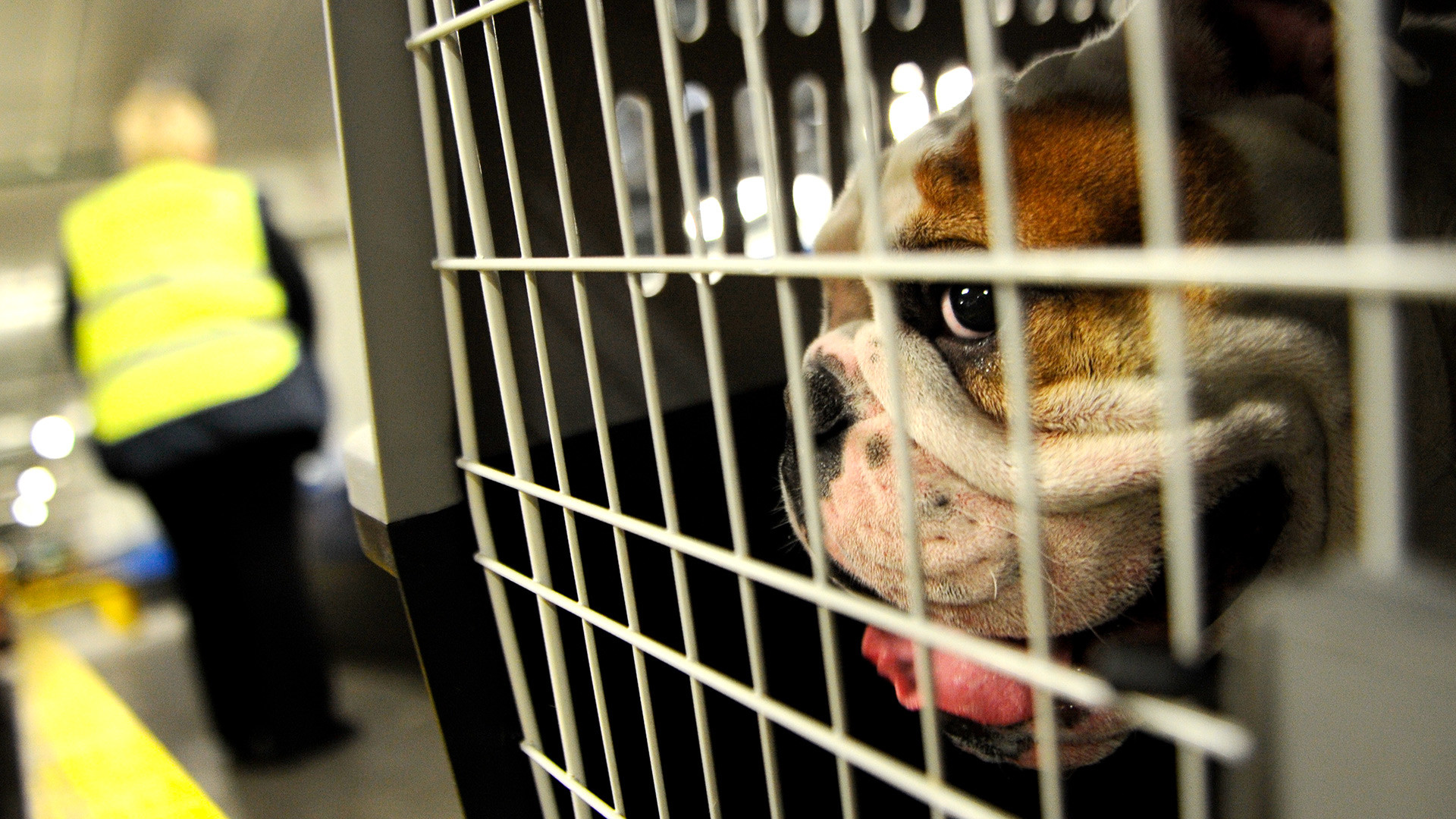
Travel by plane
Every airline has its own requirements for travel with pets, and the rates, rules, and conditions of transportation vary. It’s better to check and warn the company in advance about your travel plans with a pet, ideally at the moment when booking your ticket.
Before airport check-in, the animal should pass veterinary control to make sure it’s healthy and will not have a problem during the flight. In addition, the microchip must be verified. Representatives of Rosselkhoznadzor also might replace national veterinary certificates with international ones if necessary (for free). If there are no questions, then they’ll permit the pet to travel.
At check-in, the pet will be weighed, and the owner will have to pay for its transportation according to the airline’s fees. Whether the pet travels with you in the cabin or in the baggage hold is up to the airline. Each company has its own rules, and some don’t allow animals in the cabin, while others allow only two pets of the same type, for example, two cats.
Here you can check the requirements of major Russian airline companies: Aeroflot , S7 and Pobeda .
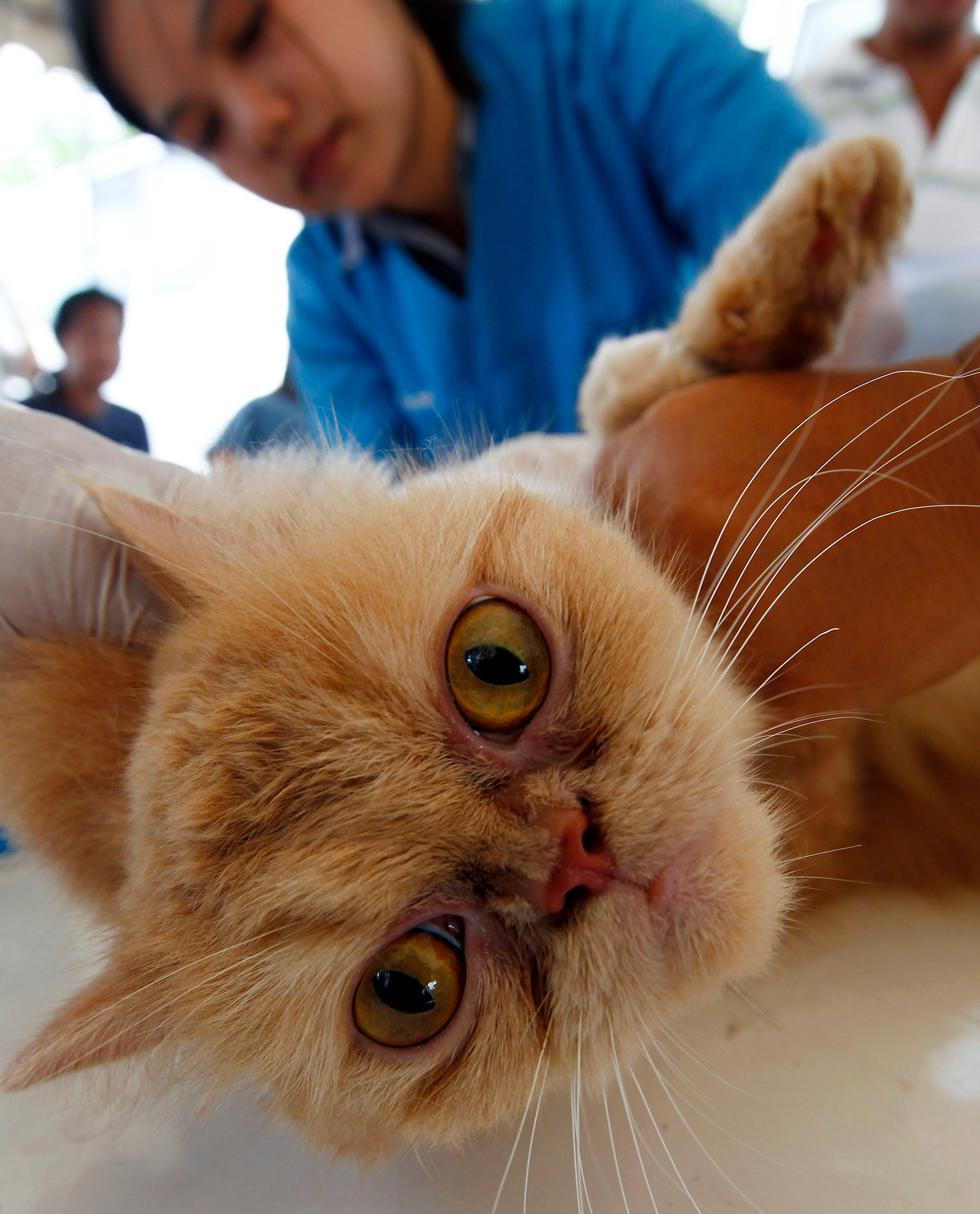
Travel by train
Traveling by train doesn’t require veterinary permits, but it will incur extra costs. Russian Railways allows small pets in a bag or box to travel for a fee that ranges from 200 to 3,000 rubles ($3-$51) depending on the distance (check here ). On the Sapsan high-speed train, there is a fixed rate for small pets - 400 rubles ($6.8) for economy class.
If you plan to travel with a large dog (not more than two allowed), then you have two options: book a compartment, or travel in one of the vacant vestibules. Also, the dog should be accompanied and wear a muzzle. Guide dogs for those with vision impairment are the only exception, and they travel for free.
If using any of Russia Beyond's content, partly or in full, always provide an active hyperlink to the original material.
to our newsletter!
Get the week's best stories straight to your inbox
- How to visit Russia without trouble at customs
- Culinary frontiers: Is it possible to bring food across the Russian border?
- How much do Russians spend on cats and dogs?
- 8 topics you should not bring up in front of Russians
- How poachers, smugglers, and the FSB go to war over caviar in Russia
This website uses cookies. Click here to find out more.

Travelling to Russia with Pets: Visa Rules and Regulations
Travelling to Russia with pets can be a wonderful experience, but it is important to be aware of the rules and regulations regarding visas. This blog post will provide you with all the information you need to know before planning your trip.
Visa Requirements
In order to travel to Russia with pets, you will need to apply for a visa. The process may vary depending on your country of residence, so it is important to check the specific requirements for your situation. Here are some general guidelines:
- Ensure that your pet has all the necessary vaccinations and paperwork.
- Contact the Russian embassy or consulate in your country to inquire about the visa application process for pet owners.
- Provide all the required documents, including proof of ownership, health certificates, and vaccination records.
- Pay the necessary fees and wait for the visa to be processed.
Rules and Regulations
Once you have obtained your visa, it is important to familiarize yourself with the rules and regulations regarding travelling to Russia with pets. Here are some key points to keep in mind:
- Only certain types of pets are allowed to enter Russia. Commonly allowed pets include dogs, cats, and birds.
- There may be restrictions on the number of pets you can bring with you.
- Your pets may be subject to quarantine upon arrival in Russia. Make sure to check the specific requirements and duration of quarantine for your pet.
- Ensure that your pet is properly vaccinated and has all the necessary health certificates.
- It is recommended to have your pet microchipped for identification purposes.
- Follow all customs and immigration regulations when travelling with your pet.
By following these rules and regulations, you can ensure a smooth and hassle-free trip to Russia with your beloved pets.
Search Visa and Apply Now
Recent post, blog search by country.
We’re sorry, this site is currently experiencing technical difficulties. Please try again in a few moments. Exception: request blocked
Questions about transporting a pet?
Contact | email | facebook.
Home > Pet Passports > United States Pet Passport & Import Regulations
United States Pet Passport & Import Regulations (excluding Guam & Hawaii)
These regulations do NOT include the State of Hawaii or Guam. Regulations to import a dog or cat to Hawaii or import a dog or cat to Guam . Unless otherwise stated, the regulations below apply to domestic dogs, cats and ferrets. Owners of other pets should refer to item 13.
The Center for Disease Control (CDC) has additional requirements the import of dogs from the following high-rabies countries. Dogs who have resided in, visited or entered the following countries within 6 months of import are also affected by this suspension. All pet owners wishing to import their dog from these high rabies countries to the United States are not subject to these requirements if they meet the following qualifications: Has a rabies certificate* proving a current rabies vaccination administered by a licensed veterinarian in the United States. Has proof of a microchip listed on the rabies certificate. Is at least 6 months old. Is healthy upon arrival. Enters the United States at an approved point of entry (see below). UPDATE: *Effective March 1, 2023, all dogs entering the United States from high-rabies countries with a rabies vaccination that was administered in the origination country must have a completed Rabies Vaccination and Microchip Record. This legislation includes dogs who have resided in, visited, or cleared customs and entered such a country within 6 months of import. Dogs intending to enter the US from these countries that do not meet the above criteria can either apply for an import permit or enter the United States at an airport that has approved quarantine facilities (MIA, LAX, JFK, ATL, IAD). If a valid rabies titer test is available, then quarantine will not be imposed on healthy dogs. If the titer test is invalid or no titer test is available, then a 28 day quarantine will be imposed. These requirements have been extended to July 31, 2024. HIGH-RABIES COUNTRIES
How to get a pet passport to import your dog, cat or other animal to the united states in 7 steps.
Pet passports (except EU Pet Passports) are simply the collection of documents required to import your pet to a specific country.
Step #1 - Export Requirements
Research export requirements for your origination country. Ask your veterinarian or Ministry of Agriculture. You can also find export requirements for many countries here.
Step #2 - Proof of rabies vaccination
Determine if the United States will require a rabies certificate for your pet to clear customs. Proof of rabies vaccination are required to import your pet to the United States from many countries.

Step #3 - Screwworm Inspection
Determine if you are originating in a screwworm-infected country in which case a screwworm inspection is required.
Step #4 - Import Permit
Determine if an import permit is required to import your dog when unaccompanied.
Step #5 - Veterinary Health Certificate
Visit your veterinarian to issue a pet health certificate for the United States .
Step #6 - Requirements to Import a Puppy
Determine requirements for importing a puppy to the United States .
Step #7 - Requirements to Return Home
Determine requirements to re-import your pet to your originating country. Find Regulations to re-import your pet to over 220 countries.
Information on Importing a Pet to the United States
Pet microchip.
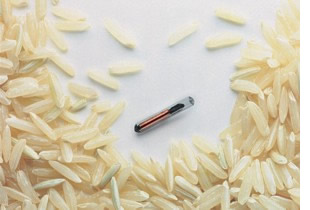
The United States does not require that your pet be identified with a pet microchip unless your pet is entering the United States under one of the following conditions:
- Your pet is entering the United States from a high-rabies country.
- Your dog is entering the United States for commercial reasons (resale, adoption, etc.).
- Your dog is entering the United States from a country identified as having African Swine Fever (see step 5)

Vaccination Certificates

If your dog is entering the United States from a country the US considers as a high risk of rabies ( Click here for high-rabies countries ), your dog will need valid rabies certificate* proving current rabies vaccination. Dogs that have never been vaccinated against rabies must be vaccinated at least 28 days prior to arrival.
*Effective March 1, 2023, a completed Rabies Vaccination and Microchip Record will be required for dogs with current rabies vaccinations administered in a high-rabies country who are entering the United States. Foreign-issued vaccination booklets or rabies certificates will not be accepted. The Rabies Vaccination and Microchip Record is not required for dogs returning to the United States from non-high-rabies countries; however, it is recommended.
If your dog is entering the United States from a country that does not require a rabies vaccination, you must provide proof that it has lived in the origin country at least 6 months or since birth.
If your dog is over 15 months of age and you can provide rabies history that your dog has been vaccinated on or after 3 months of age and all boosters were administered before the previous vaccination expired, your dog does not need to wait 28 days after their last rabies vaccination.
The United States does accept 3 year rabies vaccinations. If the expiration date of the vaccination is not shown on the health certificate, then the date of vaccination must be less than 12 months prior to entry to the United States.
All requests to import an unvaccinated dog must be approved at least 10 business days in advance. Permits will only be given only to US residents and visitors staying 30 days or more in the United States.
Dogs being imported for commercial resale or adoption must also be vaccinated for rabies and distemper, hepatitis, leptospirosis, parvovirus, and parainfluenza virus (DHLPP). See step 10 for more information.
Rabies vaccinations for cats are not required to enter the country, but requirements may be subject to State and local ordinances.

Rabies Titer Test (FAVN)

A rabies titer test is required to enter the United States from all high-rabies countries to avoid quarantine. If a valid rabies titer test administered at least 45 days before travel is not available, your pet will need to enter an Animal Quarantine Facility in an approved port of entry.

Screwworm Inspection - Dogs Only
Before your dog can enter the United States from the following countries, it must be inspected for certain screwworms within five days prior to entering the United States. Your veterinarian must verify that your pet has been inspected for screwworm, and the results are negative.
Screwworm Countries: Angola, Argentina, Aruba, Bhrain, Bangladesh, Benin, Bolivia, Botswana, Brazil, Brunei, Burkina Faso, Burundi, Cambodia, Cameroon, Central African Republic, China, Colombia, Congo (Democratic Republic of), Congo, Costa Rica, Democratic Republic, Dominican Republic, Easter Island, Ecuador, Equatorial Guinea, Eritrea, Ethiopia, French Guinea, Gabon, Gambia, Ghana, Guinea, Guinea-Bissau, Guyana, Haiti, hong Kong, India, Indonesia, Iran, Iraq, Ivory Coast, Jamaica, Kenya, Kuwait, Laos, Lesotho, Liberia, Macau, Malawi, Malaysia, Mali, Mauritania, Mozambique, Myanmar, Namibia, Nicaragua, Nigeria, Oman, Palau, Panama, Papua New Guinea, Paracel Islands, Paraguay, Peru, Philippines, Qatar, Rwanda, Saudi Arabia, Senegal, Sierra Leone, Singapore, South Africa, Spratly Islands, Sri Lanka, Suriname, Swaziland, Taiwan, Tanzania, Thailand, Timor-Leste, Togo, Trinidad and Tobago, Uganda, United Arab Emirates, Uruguay, Venezuela, Vietnam, Yemen, Zambia and Zimbabwe.
African Swine Flu - Dogs Only COMMERCIAL RESALE
Additional requirements will apply to dogs entering the US for commercial resale from the following countries identified for African Swine Fever:
Continent of Africa, Armenia, Azerbaijan, Belarus, Bhutan, Kingdom of Brazil, excluding the State of Santa Catarina, Burma (aka Myanmar), Cambodia China, People’s Republic of, Cuba, Dominican Republic, Georgia, Haiti, Hong Kong (Special Administrative Region of the People's Republic of China), India, Indonesia (Republic of), Korea, Democratic People's Republic of, Korea, Republic of, Kosovo, Laos, Malaysia, Mauritius, Moldova, Mongolia, Nepal, Papua New Guinea, the Philippines, Russia, Serbia, Singapore, the Democratic Republic of Timor-Leste, Ukraine, and Vietnam.
Additionally, any restricted zone in the European Union (EU) established by the EU or any EU Member State because of detection of African swine fever in domestic or feral swine is affected by these requirements.
- The dog and their crate must be free of dirt, wood shavings, hay, straw, or any other organic or natural bedding material.
- All bedding that accompanies the dog during transit must be properly disposed of at the U.S. port of entry.
- Each dog must have an ISO-compliant microchip implanted, and the individual microchip number must be verified immediately before each dog is bathed.
- Each dog must be bathed at the U.S. port of entry within 2 calendar days of arrival in the United States. Bathing must be documented in the Veterinary Services Dog Import Record.
Tapeworm Treatment - Dogs Only
Collies, shepherds, and other dogs to be used in the handling of livestock and that are imported from any part of the world except Canada, Mexico, and regions of Central America and the West Indies must have a tapeworm treatment administered by a licensed veterinarian shortly prior to entry to the United States and are subject to inspection and quarantine.
Import Permit
Effective July, 2021, all DOGS entering the United States from countries classified as high-rabies without a current rabies vaccination administered by a US-based veterinarian must either apply for an import permit or enter the US at an airport with a government quarantine facility (see above). If an import permit is secured, your dog can enter the US without quarantine.
All dogs being imported to the United States for commercial resale or adoption must have an import permit issued by the United States Department of Agriculture. See step 10 for more information.
An import permit will be required for many live animals including birds entering Alaska from Canada via a land border port. Cats and dogs are not included in this requirement; however, they will need a health certificate with a traceable number. Forms downloaded from the Internet will not be accepted.
Pet Health Certificate
A licensed veterinarian must complete and sign a pet health certificate . This certificate should be in English or be accompanied by a version translated in English. It should identify the animal, the dates of vaccination, the manufacturer and the expiration date of the rabies vaccine.
For pets entering Alaska from the United States mainland: the APHIS 7001 form will only be accepted if it has a unique and trackable identification number. A certificate number must be printed on the form. This form cannot be downloaded from the Internet.
Countries that require a rabies vaccination for dogs

Dogs entering the United States from these high-rabies countries will require a rabies certificate and should be vaccinated for rabies no sooner than 3 months of age and wait for 28 days before entering the United States. To avoid quarantine or when applying for an import permit, dogs should also have a rabies titer test 30 days after their rabies vaccination and more than 45 days prior to import.
Afghanistan, Algeria, Angola, Armenia, Azerbaijan, Bangladesh, Belarus, Belize, Benin, Bhutan, Bolivia, Botswana, Brazil, Brunei, Burkina Faso, Burma (Myanmar), Burundi, Cambodia, Cameroon, Central African Republic, Chad, China, Colombia, Comoros, Côte D'Ivoire (Ivory Coast), Croatia, Cuba, Democratic Republic of the Congo, Djibouti, Dominican Republic, Ecuador, Egypt, El Salvador, Equatorial Guinea, Eritrea, Ethiopia, French Guiana, Gabon, Gambia, Georgia, Ghana, Grenada, Guatemala, Guinea, Guinea-Bissau, Guyana, Haiti, Honduras, India, Indonesia, Iran, Iraq, Jordan, Kazakhstan, Kenya, Kuwait, Kyrgyzstan,Laos, Lebanon, Lesotho, Liberia, Libya, Madagascar, Malawi, Malaysia, Mali, Mauritania, Moldova, Mongolia, Morocco, Mozambique, Namibia, Nepal, Nicaragua, Niger, Nigeria, North Korea, Oman, Pakistan, Peru, Philippines, Qatar, Republic of the Congo, Rwanda, Russia, Sao Tome and Principe, Saudi Arabia, Senegal, Sierra Leone, Somalia, South Africa, South Sudan, Sri Lanka, Sudan, Suriname, Swaziland, Syria, Tajikistan, Tanzania (including Zanzibar), Thailand, Timor-Leste (East Timor), Togo, Tunisia, Turkey, Turkmenistan, Uganda, Ukraine, United Arab Emirates, Uzbekistan, Venezuela, Vietnam, Western Sahara, Yemen, Zambia and Zimbabwe.
Entering the United States by Air

Pets from countries that the United States recognize as rabies free can enter the United States at international airports in many cities including but not limited to New York, Chicago, Washington DC, Atlanta, Miami, Houston, Los Angeles, Portland Seattle and Chicago.
All domestic dogs and cats must be free of evidence of disease communicable to humans when examined at the port of entry. If the animal is not in apparent good health, further examination by a licensed veterinarian may be required at the owner's expense.
All pets entering the United States unaccompanied as air cargo must be claimed by someone with US legal resident status or a citizen of the US and must have a valid US address.
It is strongly advised that dog owners importing more than 5 dogs owned personally by them via air cargo contact the CDC to avoid having the import be classified as commercial.
All interstate transports where a health certificate is required should use a multi-copy health certificate with a tracking number or the veterinarian must file the certificate electronically. Currently, this requirement primarily applies to airline travel.
Puppies and Kittens

Kittens are not required to be vaccinated for rabies to enter the US, however, they should travel with a recent health certificate and can be subject to State requirements which is why rabies vaccination is recommended.
Non-Commercial Import of Puppies
Puppies entering the United States for non-commercial reasons from all countries not listed in step #7 must be vaccinated for rabies at 3 months of age and wait for 28 days before entering the country. In certain cases, pre-approval for home quarantine can be obtained from the Center for Disease Control for unvaccinated puppies entering from non-rabies-free countries. See step 2 for more information.
Proof of age should be available.
Commercial Import of Dogs and Puppies
Puppies and dogs entering the United States intended for resale* or adoption must be 6 months of age and may not enter the United States from any country until fully vaccinated (rabies and distemper, hepatitis, leptospirosis, parvovirus, and parainfluenza virus (DHLPP) and accompanied with an import permit.
This includes dogs being imported from Puerto Rico and all US territories. An exception would be dogs being imported for veterinary treatment that is unavailable in the originating country or dogs being imported for research purposes.
*The term “dogs imported for resale” includes dogs imported for sale in wholesale channels, at retail, and for adoption after arrival in the United States, as well as dogs imported for other purposes involving transfer of ownership or control of the dog to another person for more than de minimis consideration after the dog's arrival in the United States.
This rule does not apply when there is no transfer of ownership or control of a dog to another person for more than de minimis consideration after the dog's importation into the United States. Therefore, dogs imported by a person who will use the dog as a personal pet, for sport, for shows or competitions, or for breeding or semen collection are not subject to the 6-month age restriction or any other requirements of this rule.
Banned Breeds

The United States does not ban breeds, however, some cities do. Visitors to these cities will be responsible for their pet's behavior.
Exporting Pets from the United States
All resident pets leaving the United States must send relevant paperwork required for the destination country to the State USDA office for endorsement prior to leaving the country. Additionally, transiting pets whose permits or health certficiates have expired will be required to obtain these documents in the United States and have them endorsed prior to leaving the country.
Pets returning to the United States are subject to the same passport requirements as those entering for the first time. This means that pet owners returning to the United States should consider getting a new health certificate completed by a vet in the country you are visiting if you stay for more than 30 days as many States require a current health certificate.
Other Animals

There are no rabies requirements for other species of rodents, rabbits, ornamental fish, intervebrates, amphibians and reptiles imported to the United States. These pets should travel with health certificates issued prior to travel.
Birds entering the United States from any country will require permits from the US Fish and Wildlife Service. The following regulations assume an import of 5 or less birds.
Birds entering the United States from Canada by air or seaport will require an import permit, health certificate and veterinary inspection.
In addition to these requirements, non-US-resident pet birds entering the US from all countries except Canada must enter the United States must travel directly to quarantine at the New York Animal Import Center in Newburgh, NY or the Miami Animal Import Center in Miami, FL. A 30-day quarantine is required for these pet birds and includes mandatory testing.
Birds entering the United States from Mexico or other HPAI-infected country** must undergo 21 days pretravel quarantine in Mexido and enter by air at international airports located in Miami or New York and be subject to 30 days of quarantine. An import permit, health certificate and veterinary inspection will apply.
Birds entering the United States from HPAI-free countries are subject to all requirements above except the 21 day pre-travel quarantine.
Pet birds weighing more than 100 grams, must be identified by one of three approved means (microchip, leg band or tattoo) in order to qualify for home quarantine, in lieu of Federal quarantine, upon returning to the United States from HPAI-FREE countries. The identification must be documented on the accompanying U.S. origin health certificate.
**HPAI-infected countries are: Afghanistan, Albania, Azerbaijan, Bangladesh, Benin, Bhutan, Botswana, Bulgaria, Burkina Faso, Cambodia, Cameroon, Cambodia, Canada, China, Croatia, Djibouti, Egypt, Gabon, Ghana, Guinea, Hong Kong, India, Indonesia, Iran, Iraq, Israel, Ivory Coast, Jordan, Kazakhstan, Korea, Kuwait, Laos, Lebanon, Lesotho, Libya, Macau, Malaysia, Mali, Moldova, Myanmar, Nepal, Niger, Nigeria, Pakistan, Palestine, Russia, Saudi Arabia, Senegal, South Africa, South Sudan, Sudan, Taiwan, Thailand, Togo, Turkey, Uganda, Ukraine, Vietnam and Zimbabwe.
Live finfish of most species may be imported into the United States without import requirements. There are 8 species of fish that will require an import permit and health certificate completed by a licensed veterinarian in the originating country: common carp, including koi carp (Cyprinus carpio), goldfish (Carassius auratus), grass carp (Ctenopharyngodon idellus), silver carp (Hypophthalmichthys molitrix), bighead carp (Aristichthys nobilis), Crucian carp (Carassius carassius), tench (Tinca tinca), and sheatfish (Silurus glanis).

If your pet is not a dog, cat or ferret, and especially if it is a turtle or parrot, you should verify that it is not protected under the Convention on International Trade in Endangered Species of Wild Fauna and Flora (CITES). You will need to apply for additional permits if this is the case. Over 180 countries participate and enforce CITES regulations.
- Search CITES database .
- Read More about CITES
Need More Assistance?

To the best of our ability, we ensure that recommendations given on PetTravel.com reflect the current regulations. We cannot predict how a given country may enforce these regulations. Noncompliance may result in the need to make arrangements to put your pet into quarantine at your expense, return your pet to the country of origin, or euthanize your pet. We suggest that you minimize the disruptions that may occur by following the rules of the country you are visiting.
Further detail on import permits, costs, tests and procedures are available at minimal cost at PetTravelStore.com under Pet Passports. We also stock all the equipment and accessories your pet will need for traveling domestically or internationally. Same day shipping Monday through Friday until 2:00 PM EST.
GOT QUESTIONS OR COMMENTS???
Due to the high demand, we may be unable to respond to your question quickly if posted below. If you need a fast response, you can post them directly to our Facebook page , blog , or forum . We will respond as soon as we can.
Please note that the accuracy of comments made from Facebook users other than Pet Travel have not been verified. We do not endorse any person or company that may offer transport services through posts to this webpage.
Watch CBS News
Flying with pets? Here's what to know.
By Anne Marie Lee
Edited By Alain Sherter
Updated on: April 6, 2024 / 10:08 AM EDT / CBS News
Thinking of taking your dog or cat with you the next time you fly? For a growing percentage of the 90.5 million pet owners in the U.S., the answer is yes. But while the notion of boarding a plane with your pet may seem simple, the rules and restrictions around traveling with an animal can be confusing.
Eight major U.S. airlines allow pets to fly in-cabin as carry-ons. But flying with your pet takes research and planning, as pet policies vary from airline to airline, are steeped in restrictions, and are limited to specific countries and cities. You'll also have to pay an extra fee for your pet ranging from $95 to $200, depending on the airline and where you're flying. And restrictions often change.
For example, American Airlines recently revised its policies so passengers flying with pets may also bring one full-size carry-on or personal item. But the carrier prohibits carry-on pets on transatlantic and transpacific flights. Here's what you need to know when considering taking your fur baby with you on a plane.
Cargo, check-in or carry-on?
Most airlines offer three options for transporting animals: cargo, check-in or carry-on. But if your pet is larger than a bread box, your options are limited to the cargo or baggage check-in options, with very few exceptions.
Given that large canine breeds such as Labrador Retrievers, German Shepherds and Golden Retrievers are among the most popular dogs in the country, the size restriction for in-cabin pet travel can be a major frustration for those who would rather not fly at all if that means putting their pet in cargo.
A 2023 Forbes Adviser survey of 10,000 U.S. dog owners found that 33% of respondents fly with their pets, while 37% listed not being able to bring their dog on a plane as their biggest annoyance. (You can learn more about the differences between cargo, check-in and carry-on options here , including warnings about the dangers involved when pets travel in the cargo hold.)
Carry-on pets
Even for pet owners whose animals are small enough to fly as a carry-on, traveling is no breeze.
"When I fly with him I have to go to the desk," Margaret Rauch, 44, told CBS MoneyWatch, referring to her 15-pound poodle mix, Soda. The New York City resident has taken Soda on dozens of flights to St. Croix in the U.S. Virgin Islands, where Soda, now 4, was being fostered by a friend after being found as a stray puppy in 2021.
In addition to calling the airline in advance to register her dog for a flight, Rauch has to check in at the counter whenever she's traveling with Soda, so the airline agent can confirm her dog and pet carrier conform to the in-cabin pet requirements and that the flight hasn't already met its pet maximum.
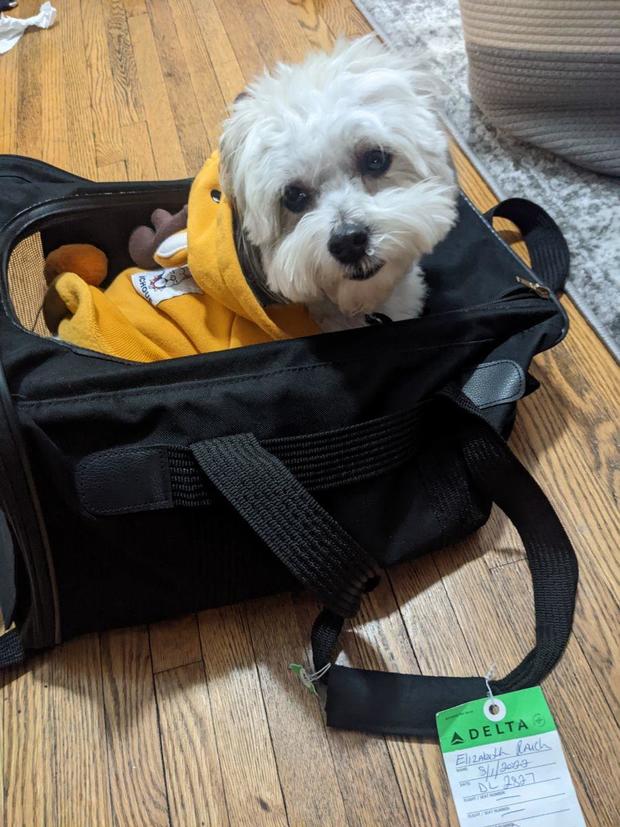
Rauch, who said she would never consider putting Soda in cargo, applauded American Airlines' new policy, while noting that in her experience the one carry-on rule was rarely enforced.
"I feel the price is already high for what I get. Even with AA's rule change, I lose the underseat space," she said. "My dog creates no extra work for anyone."
Despite the added preparation, paperwork and hassle involved in flying with Soda — not to mention the unfriendly looks she occasionally detects from fellow passengers at the sight of her pet carrier — Rauch said, "It's absolutely worth it."
Asked how the experience could be improved, she pointed to early boarding for pet owners as something that would help.
"If you can get in early, get a seat and settle down, that is an accommodation I don't expect to see anytime soon but I think it makes sense," Rauch said.
Safety and comfort
For the many Americans who see their pets practically as family members, one of the most challenging aspects of flying is ensuring their animal's comfort and safety.
"The increasing humanization of pets, which involves treating them as part of the family rather than as mere animals, has increased the demand for pet travel services that are of high quality and can be customized to meet the specific needs of each pet," LinkedIn reported in December.
Among other tips, the U.S. Department of Transportation and animal experts recommend that you not feed your pet four to six hours before a flight and limit their water intake. Others also suggest keeping bottled water on hand at all times. Additionally, most airlines require certain vaccination and vet certification that your pet is healthy enough to fly. Individual countries also have their own requirements for pets to enter.
Not surprisingly, some airlines do better than others at handling pets. One of the best-rated carriers for pet travel is Alaska Airlines, which has repeatedly topped rankings, such as NerdWallet's Most pet-friendly airlines of 2024. In recent years, the airline also has maintained one of the industry's lowest incident ratings, according to Veterinarians.org. United Airlines and Delta are among the airlines with the highest incident rates, according to the pet information website.
On Rauch's first plane trip with Soda traveling home to New York, a layover in Miami led to the flight sitting on the tarmac for two hours. Calming treats are something that helps keeps her dog relaxed on flights. She also withholds Soda's food and limits his water intake up to five hours before a flight, which is also helpful given that he doesn't like using pet relief areas, which she said generally smell of urine and can be overwhelming for dogs. Flights between New York City and St. Croix are generally under six hours.
"I'm not sure how I'd handle a flight to Singapore," Rauch said.
Here's a rundown of U.S. airlines' pet travel policies, along with fees and and restrictions:
Alaska Airlines
Pet fee: $100
Pets allowed: Dogs and cats are the only pets allowed in-cabin on international trips and flights to Hawaii. Domesticated rabbits and small household birds are allowed as carry-on on domestic flights.
Destinations: Domestic and international, with additional requirements and documentation required for pets traveling to Hawaii or internationally .
See Alaska's full pet policy here .
American Airlines
Pet fee: $150
Pets allowed: Dogs, cats
Destinations:
- Within the 48 contiguous U.S.
- The U.S. and Canada*
- Puerto Rico
*Additional special restrictions may apply. See American's full pet policy here .
Pet fee: $75-$200, depending on destination
Pets allowed: Dogs, cats, household birds
Pet friendly destinations:
- U.S., Virgin Islands and Puerto Rico
- International destinations with the exception of Australia, U.K., Republic of Ireland and others .
Pets are not permitted on flights to Hawaii. See Delta's full pet policy here .
Frontier Airlines
Pet fee: $99
Pets allowed: Dogs, cats, rabbits, guinea pigs, hamsters and household birds
Destinations: Domestic flights and international flights to and from the Dominican Republic and Mexico.
See Frontier's full pet policy here .
Pet fee: $125
Destinations: Domestic and international. See exceptions for international flights here .
See JetBlue's full pet policy here .
Southwest Airlines
Pet fee: $125 per pet carrier on the U.S. mainland; $35 per pet carrier between Hawaiian Islands
Destinations: Domestic U.S. flights only. For travel to Puerto Rico, specific requirements may apply . For Hawaii travel, see rules and regulations here.
See Southwest's full pet policy here .
Spirit Airlines
Pets allowed: Dogs, cats, birds (with the exception of flights to or from Puerto Rico and the U.S. Virgin Islands) or rabbits (with the exception of flights to or from Puerto Rico and the U.S. Virgin Islands).
Destinations: Domestic flights including Puerto Rico and St. Thomas, U.S. Virgin Islands
See Spirit's full pet policy here .
United Airlines
Destinations: Domestic and international flights with a list of exceptions. United does not allow pets to fly to, from or through certain states and countries. View the list here .
See United's full pet policy here .
More from CBS News

5 important debt relief options to know

Owe back taxes on April 15? Here's how tax relief can help now.

Are gold bars and coins worth it with inflation on the rise?

7 best bank account bonuses for April 2024 (up to $600)
- Election 2024
- Entertainment
- Newsletters
- Photography
- Personal Finance
- AP Investigations
- AP Buyline Personal Finance
- Press Releases
- Israel-Hamas War
- Russia-Ukraine War
- Global elections
- Asia Pacific
- Latin America
- Middle East
- Election Results
- Delegate Tracker
- AP & Elections
- March Madness
- AP Top 25 Poll
- Movie reviews
- Book reviews
- Personal finance
- Financial Markets
- Business Highlights
- Financial wellness
- Artificial Intelligence
- Social Media
Istanbul airport provides anxious travelers with paw-sitive experience by hiring 5 therapy dogs
Five furry companions have been by the aviation hub hired to provide anxious passengers a ‘paw-sitive’ experience (AP Video by Mehmet Guzel; production by Ayse Wieting)
A traveler pets the dog Kuki while walking with handler through Istanbul Airport in Turkey, Wednesday, April 3, 2024. Istanbul Airport has made five new hires to provide stress-free travel experience for anxious passengers: therapy dogs that are ready to offer support with snuggles, belly rubs and sloppy kisses. (AP Photo/Khalil Hamra)
- Copy Link copied
The airport therapy dog Alita wears a uniform while walking with a handler through Istanbul Airport in Turkey, Wednesday, April 3, 2024. Istanbul Airport has made five new hires to provide stress-free travel experience for anxious passengers: therapy dogs that are ready to offer support with snuggles, belly rubs and sloppy kisses. (AP Photo/Khalil Hamra)
A traveller pets the airport therapy dog Kuki while walking through Istanbul Airport in Turkey, Wednesday, April 3, 2024. Istanbul Airport has made five new hires to provide stress-free travel experience for anxious passengers: therapy dogs that are ready to offer support with snuggles, belly rubs and sloppy kisses. (AP Photo/Khalil Hamra)
A child plays with airport therapy dogs Alita and Kuki at Istanbul Airport in Turkey, Wednesday, April 3, 2024. Istanbul Airport has made five new hires to provide stress-free travel experience for anxious passengers: therapy dogs that are ready to offer support with snuggles, belly rubs and sloppy kisses. (AP Photo/Khalil Hamra)
Airport therapy dog Alita looks at her handler while walking through Istanbul Airport in Turkey, Wednesday, April 3, 2024. Istanbul Airport has made five new hires to provide stress-free travel experience for anxious passengers: therapy dogs that are ready to offer support with snuggles, belly rubs and sloppy kisses. (AP Photo/Khalil Hamra)
A traveller pets the dog Alita while two handlers walk airport therapy dogs Alita and Kuki through Istanbul Airport in Turkey, Wednesday, April 3, 2024. Istanbul Airport has made five new hires to provide stress-free travel experience for anxious passengers: therapy dogs that are ready to offer support with snuggles, belly rubs and sloppy kisses. (AP Photo/Khalil Hamra)
A traveller pets the airport therpay dog Alita in Istanbul Airport in Turkey, Wednesday, April 3, 2024. Istanbul Airport has made five new hires to provide stress-free travel experience for anxious passengers: therapy dogs that are ready to offer support with snuggles, belly rubs and sloppy kisses. (AP Photo/Khalil Hamra)
A traveller pets the airport therapy dog Alita while walking through Istanbul Airport in Turkey, Wednesday, April 3, 2024. Istanbul Airport has made five new hires to provide stress-free travel experience for anxious passengers: therapy dogs that are ready to offer support with snuggles, belly rubs and sloppy kisses. (AP Photo/Khalil Hamra)
Two handlers walk with airport therapy dogs Alita and Kuki through Istanbul Airport in Turkey, Wednesday, April 3, 2024. Istanbul Airport has made five new hires to provide stress-free travel experience for anxious passengers: therapy dogs that are ready to offer support with snuggles, belly rubs and sloppy kisses. (AP Photo/Khalil Hamra)
The official ID badge of airport therapy dog Kuki is displayed on her showing a photo and her information at Istanbul Airport in Turkey, Wednesday, April 3, 2024. Istanbul Airport has made five new hires to provide stress-free travel experience for anxious passengers: therapy dogs that are ready to offer support with snuggles, belly rubs and sloppy kisses. (AP Photo/Khalil Hamra)
Travellers pet the airport therapy dog Alita while walking with a handler through Istanbul Airport in Turkey, Wednesday, April 3, 2024. Istanbul Airport has made five new hires to provide stress-free travel experience for anxious passengers: therapy dogs that are ready to offer support with snuggles, belly rubs and sloppy kisses. (AP Photo/Khalil Hamra)
ISTANBUL (AP) — Five new hires are selflessly roaming the halls of one of the world’s busiest transportation hubs, hoping to provide a paw-sitively stress-free travel experience for anxious passengers.
Meet Istanbul Airport’s therapy dogs — always ready to offer support with snuggles, belly rubs and sloppy kisses.
The official ID badge of airport therapy dog Kuki is displayed on her showing a photo and her information at Istanbul Airport in Turkey, Wednesday, April 3, 2024. (AP Photo/Khalil Hamra)
The Associated Press caught up with Kuki and Alita, two of the dogs taking part in the pet-friendly airport’s new pilot project aimed at easing stress and anxiety among travelers.
All four-legged members of the program are certified therapy dogs, professionally trained and conditioned to comfort humans.
The “Therapy Dog Team” has been on duty since late February following months of preparation and intensive training, learning desensitization to distracting stimuli, like sounds and people.
“We have to ensure that they are safe and they are 100% adapted to all environments,” said Kadir Demirtas, Istanbul Airport’s customer experience manager.
A child plays with airport therapy dogs Alita and Kuki at Istanbul Airport in Turkey, Wednesday, April 3, 2024. (AP Photo/Khalil Hamra)
Kuki, a Lagotto Romagnolo, an Italian retriever breed, is team captain. He works hard to please but likes his breaks and sometimes plays hooky.
That’s OK, however.
The team’s veterinarian said each dog’s temperament dictates their hours on the job each day.
“They walk around the airport led by their handlers who are also responsible for their care,” said Volkan Arslan.
A traveller pets the airport therapy dog Alita while walking through Istanbul Airport in Turkey, Wednesday, April 3, 2024. (AP Photo/Khalil Hamra)
The dogs, who are airport employees with official badges and uniforms, have a set schedule and work during peak travel hours, from 10 a.m. to 4 p.m.
Alita, a border collie, is Kuki’s teammate. Her intense gaze and dedication to her handler are striking, as is her ability to soothe and calm nerves.
“We are always surrounded by people who are constantly petting her,” said Volkan Gul, Alita’s dedicated handler, adding that she helps them relax.
A traveller pets the airport therapy dog Kuki while walking through Istanbul Airport in Turkey, Wednesday, April 3, 2024. (AP Photo/Khalil Hamra)
Airport officials said they already have plans to expand the pilot project following initial positive feedback from travelers.

IMAGES
VIDEO
COMMENTS
Russia allows for clinical examination of the pet to occur up to 14 days prior to travel, however health certificate issuance by the USDA Accredited Veterinarian and endorsement by APHIS must occur within five (5) days of the pet's travel.
Russia Pet Import Rules and Requirements. Bringing pets to Russia means undergoing an import process that will most likely take at least 30 days to complete. In addition to basic vaccines, including a rabies vaccine, pets must also have a microchip implanted for identification purposes. Shipping pets to Russia also means gathering the correct ...
However, Russia has its own scheme called the Pet Passport, which allows pets to travel between member states without the need for quarantine. If you are traveling to Russia from a country that is part of the Pet Passport scheme, you will need to provide additional documentation, such as a Pet Passport.
We recommend you start preparing your dog or cat atleast a month in advance of your planned flight date. Puppies and Kittens may take longer to prepare. Terminal4Pets posts up to date information reflecting current regulations for pet import to the countries listed to the best of our ability. Country specific import regulations and policies are ...
The Russia Pet Passport package contains information and detailed step by step instructions on importing your dog or cat to Russia from any country. If your pet is not traveling to Russia, then you can select the country your pet is traveling to by clicking here. Carefully following these instructions will make clearing customs easier and quicker.
When checking in, you'll be issued with export paperwork, which you'll then hand over to Russian customs upon arrival. Flying with your pet usually costs an extra €50-€150 on top of your own ticket. Unfortunately, if you're flying from the UK like I was, this won't be an option for you.
To travel to the EU from Russia, the delay is three days before the pet's departure as of July 2017. This procedure costs around 600 Russian roubles. On the day of departure, arrive about three hours before your flight to allow you enough time to go through the inspection process at the airport veterinary station before you check in your ...
Before import to Russian, your caress should be identified with an ISO 11784/11785 compliant 15 digit pet microchip. Your pet's microchip number must be reflected on all documentation. Your pet's microchip number must be reflected on all documentation.
Sure, we'd be happy to help; here is an overview of the pet import requirements for Russia. To summarize, yes, your dog will need a microchip (implanted before the rabies vaccine is administered), and the rabies vaccine must be given at least 30 days before departure and less than one year before departure. A few vaccinations are also required ...
Verify your origin country's import requirements to make sure you can bring your pet home when your time in Russia ends! Leaving Russia with your pet. If you need to take a pet with you out of Russia, similar requirements apply: you must provide a certificate of health from a licensed Russian veterinarian, and evidence that all vaccinations ...
Russian Railways allows small pets in a bag or box to travel for a fee that ranges from 200 to 3,000 rubles ($3-$51) depending on the distance (check here ). On the Sapsan high-speed train, there ...
USDA Accredited Veterinarian. Russia allows for clinical examination of the pet to occur up to 14 days prior to travel, however health certificate issuance by the USDA Accredited Veterinarian and endorsement by APHIS must occur within five (5) days of the pet's travel. Guidance document for dogs and cats traveling to Russia (206.04 KB)
Travelling to Russia with pets can be a wonderful experience, but it is important to be aware of the rules and regulations regarding visas. This blog post will provide you with all the information you need to know before planning your trip. Visa Requirements. In order to travel to Russia with pets, you will need to apply for a visa.
A pet passport is a collection of documents (health, rabies, microchip certificates, import permits, FAVN test results, etc.) that are required for your pet to enter your destination country when traveling internationally. All documents are issued in your origination country by a licensed veterinarian and may or may not need a government ...
Veterinary. Our vets are always happy to give a detailed answer to your question as soon as possible. You can greatly simplify their work and speed up the response time by reading the following recommendations: 1. Indicate in the question the age of the animal, its approximate mass, breed. 2. Indicate the time when the first symptoms were noticed.
EU pet passport as travel document . Russia accepts the EU pet passport as a document on the animal's health, i.e. a health certificate. The vaccination entries in the EU pet passport required by Russia (see "Vaccinations required" below) can be certified by a private veterinary practice.
Visitors frequently inquire about traveling with their pets to the United States. For more information on traveling with pets, see Publication "Bringing Pets and Wildlife into the United States" on US Customs and Border Protection web site at CBP.gov.. Also, check with St. Petersburg VET department at Pulkovo airport (tel.: +7 (812) 331-4799, 9am-6pm) for local regulations on departing St ...
Has a rabies certificate* proving a current rabies vaccination administered by a licensed veterinarian in the United States. Has proof of a microchip listed on the rabies certificate. Is at least 6 months old. Is healthy upon arrival. Enters the United States at an approved point of entry (see below).
A 2023 Forbes Adviser survey of 10,000 U.S. dog owners found that 33% of respondents fly with their pets, while 37% listed not being able to bring their dog on a plane as their biggest annoyance ...
A traveller pets the dog Alita while two handlers walk airport therapy dogs Alita and Kuki through Istanbul Airport in Turkey, Wednesday, April 3, 2024. Istanbul Airport has made five new hires to provide stress-free travel experience for anxious passengers: therapy dogs that are ready to offer support with snuggles, belly rubs and sloppy kisses.
If you have questions about CDC requirements, contact CDC-INFO or call them at 404-718-3660. This page will guide you through the requirements for bringing privately owned, pet dogs into the United States from another country, including U.S. returning dogs. If you're bringing dogs into the United States for commercial sale or adoption ...
Find out if your pet qualifies to travel. Your animal doesn't qualify for pet travel and is subject to different import regulations and export regulations if you: Don't see your pet listed below. Are exporting semen or embryos from any animal. Have a pet that's considered livestock or poultry, like pigs or chickens.